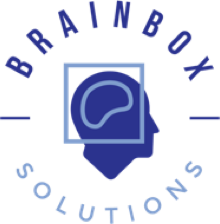Richmond, VA, – December 3, 2024 – BRAINBox Solutions today provided an update on the development of its BRAINBox TBI concussion diagnostic/prognostic tests for adult, senior, and pediatric patients. The company also highlighted trends and data from the HeadSMART II pivotal trial in adult patients and the National Institutes of Health-funded geriatric patients in leading conferences and peer-reviewed publications. Concussion is also known as ATE (Acute Traumatic Encephalopathy) or mTBI (mild traumatic brain injury).
Enrollment in the HeadSMART II trial has been expanded to meet FDA requirements for study population diversity and it is now essentially complete. The pediatric pilot study has been completed and planning has commenced for a pivotal trial in the 10-18-year-old population, where sports injuries put the youth population at risk. The geriatric trial is evaluating a refinement of the TBI test equilibrated for the elderly population and is designed to enable rapid concussion diagnosis and prognosis at the bedside with a single device. To date, 200 geriatric patients with suspected concussion have been enrolled in the trial.
“Acute traumatic encephalopathy is a major clinical issue that cuts across age groups and the injuries that occur in many different settings,” said Dr. Frank Peacock. “The data to date from these studies in presentations over the past several months and upcoming publications highlight the breadth of clinical data and the clear evidence of the continued symptoms that result from the lack of a clear diagnosis and early intervention. The tests are designed to fill a pressing need for an objective assessment to diagnose concussions and determine a patient’s prognosis at the time of injury no matter where the injury occurs. He added that the studies to date underscore diagnostic and prognostic value and the necessity of combining blood biomarkers with cognitive testing, with a panel of three blood biomarkers enhancing the specificity of cognitive tests.” Dr. Peacock is lead investigator in the HeadSMARTII trial and a member of BRAINBox’s Scientific Advisory Board.
Donna Edmonds, BRAINBox Solutions CEO, noted progress in integrating blood biomarkers into a point of care device. “We are very encouraged by the preliminary data from our collaborations to enable the blood biomarker component of the test to go on a point-of-care instrument so it can be used in any clinical setting. The ability to assess biomarkers at the point of care is key to use of the test in outpatient as well as emergency department settings,” she said.
“There has been high interest in our objective test among the emergency medicine, trauma, neurology, and neurosurgical communities,” she noted. “These presentations and publications provide an opportunity to update and educate these key stakeholders.”
The presentations and publications, by BRAINBox Scientific Advisory Board members, include:
- The upcoming 49th Emergencies in Medicine conference “A Systematic Review of Clinical Data and Biomarker Performance to Establish a Comprehensive TBI Diagnostic Panel,” which chronicles the development and establishment of the final three-biomarker panel as the component of the multi-modal test for the diagnosis and prognosis of mTBI. (December 8-13, 2024, Maui, HI)
- The International Initiative for Traumatic Brain Injury Research (INTIBR) meeting entitled, “Geriatric Acute TBI and Dementias Differ in Blood Biomarker Profiles,” presented by Damon R. Kuehl, MD, the Vice Chair of Research and Academic Affairs in the Department of Emergency Medicine at Virginia Tech Carilion, School of Medicine (September 2024 in Cambridge, UK).
- The 14th Annual Traumatic Brain Injury Conference. Kuehl delivered a presentation entitled, “An Update and Lessons Learned from HeadSMART II (HEAD Injury Serum Markers and Multi-Modalities for Assessing Response to Trauma II), and the NIH Funded “HeadSMART Geriatrics.” (May 2-3 in Washington, DC).
- A Published Commentary in the American Journal of Emergency Medicine (May 2024), which cited the value of Neurogranin in early mTBI detection. Neurogranin is a key patented biomarker and a component of the biomarker panel in the company’s multi-modal tests for mTBI diagnosis and prognosis.
- Scientific Advisory Board members have also submitted a manuscript entitled, “TBI Presentations Associated with Persistent Symptoms” reporting on important findings in the HeadSMART II study, which followed subjects out to 90 days.
BRAINBox TBI is a multi-modal test that combines clinical data, neurocognitive testing, symptom reporting and blood-based biomarkers, with proprietary AI algorithms to generate an objective score for diagnosis up to 96 hours from the time of injury. In addition, a prognosis report is generated, providing the likelihood of injury-related symptoms occurring at 30 days and up to three months after the event.
The HeadSMART II study is a multi-national, multi-site trial, in adult subjects designed to support an application for regulatory clearance by the U.S. FDA. To date the study has enrolled more than 2200 patients including healthy and trauma controls and over 500 subjects in our Normative Data Base for NeuroCognitive Assessment.
The geriatric study, supported by a grant from the National Institutes of Health, is evaluating a refinement of the mTBI test equilibrated for the geriatric population and designed to enable rapid concussion diagnosis and prognosis at the bedside with a single device.
About BRAINBox Solutions
BRAINBox Solutions is developing the first AI‐enabled, multi‐modality approach for the diagnosis and prognosis of Mild Traumatic Brain Injury, now commonly referred to as a concussion. The company seeks to establish a clinical best‐practice standard for the diagnosis and prognosis of concussion providing information which can support the ability to guide interventions. The initial product incorporates a panel of proprietary, patented blood biomarkers that can be read in a few moments on a point‐of‐care instrument or using standard laboratory systems, as well as neurocognitive testing, to provide a single‐system score that measures the severity of the injury and post-concussive symptoms. The company is led by key physician and scientific thought leaders in the field and an experienced, clinically focused management team.
